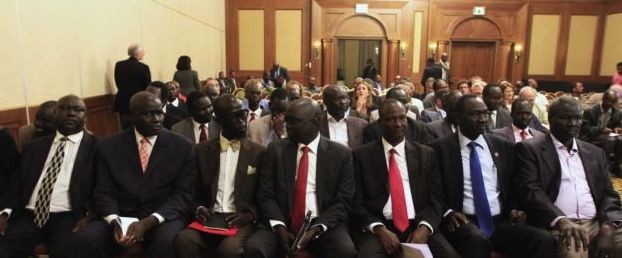Ambassador Tim Morris, the United Kingdom Envoy to the South Sudan peace talks, says it would be good to involve women in the political process set to resume in Addis Ababa next month after an adjournment of about two weeks.
His idea is apparently that some more women could participate in the peace process, either directly in the negotiations or through parallel civil society consultations that would run alongside the political talks.
The ambassador said it was vital that the two sides in the South Sudan conflict “urgently begin the next steps towards political reconciliation.”
“A process in South Sudan, agreed with the region and supported by the international community, must be negotiated and must begin. And we would particularly welcome as the Troika the involvement of civil society, and the involvement of women’s groups,” he said.
Morris was speaking at a press conference at the Sheraton Hotel in Addis Ababa on behalf of the United Kingdom, United States and Norway, a group of nations sometimes referred to as the ‘Troika’ because they typically jointly coordinate their foreign policy toward Sudan and South Sudan.
Civil society and women’s groups played no direct role in the first round of talks, which dealt primarily only with the ceasefire and detainees question, but mediators may bring them in during the next round as other political questions come into play.
By comparison, the years-long Doha negotiations process for the Darfur conflict involved workshops with representatives of women, youths, nomads and displaced people. Mediators organized the consultations both within Sudan and at the negotiations venue in Doha, both during and after the process that led to the signing of the Doha Document for Peace in Darfur (DDPD).
Rights of citizens
Speaking at the same event yesterday, EU Representative Alexander Rondos pointed out that women have been victims of the recent conflict. “Women must feel safe from violation. Children must be protected. Honor your citizens, respect your neighbors – these are sacred rules,” he said.
Three women participated in the first round of talks as delegates of the opposition party: Rebecca Garang, Sophia Pak Gai, and Banguot Amum. No women were appointed as part of the government delegation.
However, as pointed out by government spokesman Michael Makuei in an interview with Voice of America last week, “What is important is not the gender representation but what is important is the achievement of the objective.”
Some civil society in South Sudan are already pushing to be involved in the peace process. Deng Athuai, chairman of the South Sudan Civil Society Alliance, said that the group he represents have welcomed the ceasefire signed Thursday night in Addis Ababa.
But in an interview with Radio Tamazuj, he also cautioned that the agreement needed to have stronger terms on the protection and rights of civilians. He said that the politicians did not respect the citizens but had turned on each other and plunged the country into war. He emphasized that there should be accountability for abuses committed against civilians, whether by the government or rebels.
Likewise, Ambassador Morris said, “We have had disturbing and multiple reports of human rights violations, killings, and the displacement of over half a million people. There is no place for this unbridled violence in the community of nations.”
Photo: Members of the delegation representing the group led by ousted vice president Riek Machar attend the opening ceremony of South Sudan’s negotiation in Ethiopia’s capital Addis Ababa, 4 January 2014 (Reuters)




